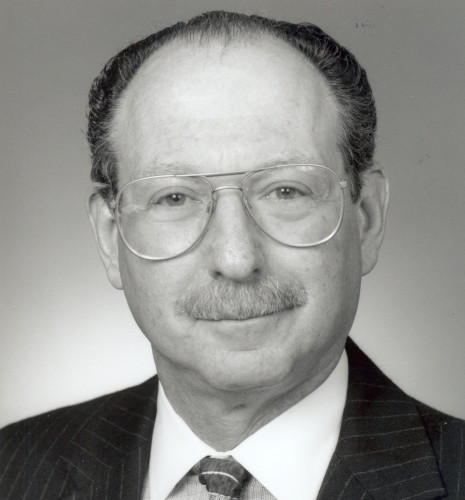The Legacy Project: Richard Borow ’59
The Richard Borow–Irell & Manella Scholarship, jointly established by the Irell & Manella Foundation and Morgan and Helen Chu, honors the memory of Richard Borow ’59.
For more than five decades, Richard H. “Dick” Borow made an indelible mark as a litigator, partner, mentor, teacher, and advocate. He was included in every edition of Best Lawyers in America; he championed his clients in numerous high-profile cases; and he mentored lawyers at UCLA School of Law and at Irell & Manella, where he founded the firm’s Litigation group. He was also known to proudly acknowledge being included on President Richard Nixon’s infamous “enemies list.”
A “tireless advocate,” Borow was dedicated to his clients and to the law throughout his career. In 1969, he represented the UCLA Academic Senate in its suit to prevent the termination of Angela Davis after the University of California Board of Regents dismissed the outspoken assistant professor because she was a member of the Communist Party. In what became “one of California’s great fights over academic freedom,” the judge ultimately ruled that Davis’ dismissal was unconstitutional.
Borow’s work “made a difference for individuals, the law, and ideals by which he lived,” said Morgan Chu, a partner at Irell & Manella. Chu called Borow “the best mentor, best teacher, and best pal.”
Borow was born in New York City in 1935. He attended the Bronx High School of Science and Hunter College. At Columbia Law School, he was elected to the board of editors of the Columbia Law Review, where he worked alongside fellow editor and future Supreme Court Justice Ruth Bader Ginsburg ’59.
After graduation, Borow remained in New York City and clerked for U.S. District Court Judge Simon Rifkind of the Southern District of New York. Rifkind was serving as Special Master for the U.S. Supreme Court in Arizona v. California, which dealt with water distribution of the Colorado River. It was Borow’s first case, and he later noted that it involved some of the most important issues he encountered during his career.
Borow ultimately settled in California, where, in 1965, he founded Irell & Manella’s Litigation group. What began as a small team of 13 lawyers grew to a practice of more than 150 lawyers at the time of Borow’s retirement in 2005. Borow, who became a partner in 1968, also served as the firm’s general counsel, chair of the Litigation group, and member of its executive committee for more than 30 years.
“Dick taught everyone to have fun practicing law at the highest levels,” said Chu. “His one failing was his jokes. Most were mediocre. Some were bad. All were well intentioned. He laughed and laughed. How fun it was to hear a great lawyer laugh at his own bad jokes! I smile whenever I think of Dick.”
During his career, Borow worked on numerous high-profile cases, including the successful representation of the California Democratic congressional delegation in the California Supreme Court as it sought to protect gains following the 1980 census. He also fought a California judge’s ruling to keep the 1980 preliminary hearing of the Hillside Strangler closed. According to the Los Angeles Times, he urged the judge “to have ‘the courage’ to declare unconstitutional a section of the penal code that then permitted a defendant . . . the right to close a preliminary hearing to the public and media. The judge refused.”
Borow was also instrumental in training the next generation of lawyers and shaping law and policy. He was an adjunct professor at UCLA School of Law for 14 years, served as chair of the Judicial Evaluations Committee of the Los Angeles County Bar Association, and was a trustee and board member of the Washington Institute for Near East Policy. At Irell & Manella, he is remembered for “his ability to recruit, train, mentor, and promote truly exceptional lawyers and then to get out of their way to enable them to succeed in their own right was the hallmark of his success.”
Retired Irell Partner David Siegel said that Borow “was singularly responsible for making me the best lawyer I could become. Not merely by teaching or showing me how best to present an argument but also how to think through all potential outcomes as we developed a strategy or legal position.” Borow, he said, “gave many of us wide-open opportunities to grow as lawyers by learning to accept ultimate responsibility for the representation of our clients.”
Following Borow’s death in September 2022, Chu and his wife, Helen, along with the Irell & Manella Foundation, established the Richard Borow–Irell & Manella Scholarship Fund in his memory.
“Dick was always proud to be a graduate of Columbia Law School,” said Chu. “Irell & Manella is delighted to have an opportunity to support students at Dick’s alma mater.”
Alumni and friends who wish to honor Borow’s legacy can make a gift here. The Irell & Manella Foundation, Morgan and Helen Chu, and retired Irell Partner David Siegel will match contributions up to a total of $150,000.
